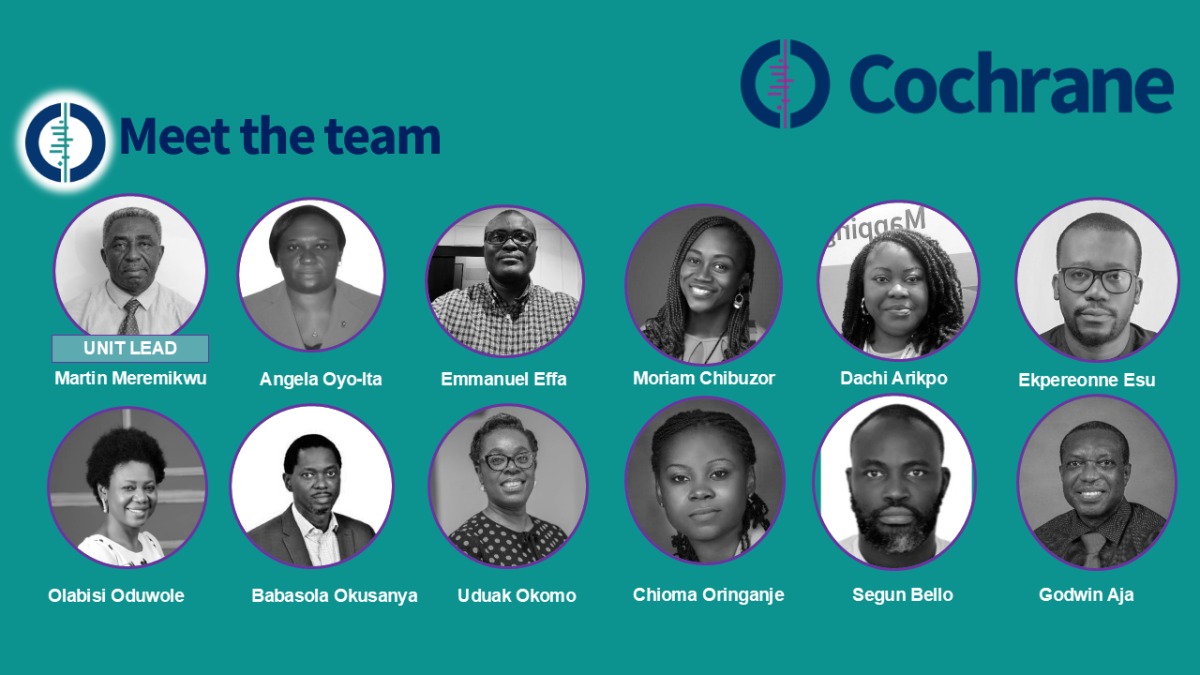
About us:
Cochrane Evidence Synthesis Unit (CESU) Nigeria is one of five units announced by Cochrane in June 2024. Our mission is to produce high-quality reviews using innovative methods, ensuring the prompt delivery of impactful Cochrane evidence. We want to help improve people’s health globally by working with diverse partners and ensuring equity and research integrity.
The unit will harness the expertise of the increasing number of academics, researchers, graduate students, clinicians and public health professionals in West Africa who are part of the Cochrane African Network. Its goal is to create trustworthy knowledge resources that can be used to shape evidence-based health policies and practices in sub-Saharan Africa and other regions.
Experience and expertise:
The Cochrane Evidence Synthesis Unit (CESU) Nigeria is hosted by the Calabar Institute of Tropical Diseases Research and Prevention at the University of Calabar Teaching Hospital, Cross River State, Nigeria. For effective functioning of the unit, the CESU Nigeria is structured around eight key sub-units, namely:
- Dissemination and Knowledge Mobilisation Unit
- Consumer Unit
- Methodology Unit
- Information Retrieval Unit
- Biostatistics and Quantitative Synthesis Unit
- Training Unit
- Research Development Unit
- Quality Assurance Unit
The newly established unit leverages the expertise of a team of reviewers and other professionals who have produced high-impact reviews that have been highly cited and have informed the development of guideline recommendations globally.
The authors within the unit have core competencies in effectiveness reviews, rapid reviews, scoping reviews, overview of reviews, narrative syntheses, qualitative evidence synthesis and decision analytic modelling.
Members of our team are represented across several Cochrane Methods Groups. These include
- Knowledge Translation Methods Group
- Rapid Reviews Methods Group
- Information Retrieval Methods Group
- Priority Setting Methods Group
- GRADEing Methods Group
- Equity Methods Group
- Economics Methods Group
As each Cochrane Methods group focuses on a specific method or review type relevant to Cochrane reviews, our membership and participation across these groups means that we are involved in Methods research, which continues to shape best practices in the conduct of systematic reviews. These involvements would keep members of our CESU at the cutting edge of evidence synthesis methods.
Our partners:
Through strategic partnerships, we are aiming to help transform health outcomes across Africa.
- Our host institution, the University of Calabar Teaching Hospital, has ongoing partnerships with several organizations. We plan to leverage these partnerships.
- CHAMPS (Child Health and Mortality Prevention Surveillance): The University of Calabar/ University of Calabar Teaching Hospital (UCTH) was recently awarded a grant by the Bill and Melinda Gates Foundation through Emory University, Atlanta, to implement a Child Health and Mortality Prevention Surveillance. As a unit of the UCTH, the CESU Nigeria partner with the CHAMPS to conduct evidence syntheses under the “Data to action” Component of the project.
- Swiss Tropical and Public Health Institute (STPH): We have an ongoing relationship and have partnered with colleagues at the Swiss Tropical and Public Health Institute (STPH) on systematic reviews of global health importance (Alternative Mass Drug Administration Regimens to eliminate lymphatic filariasis, health effects of radiofrequency electromagnetic fields on humans).
- We have also collaborated with colleagues at the Erasmus School of Health Policy and Management on a multi-country knowledge translation (KT) project that assessed how actors align KT approaches with their local environments .
- We are part of Cochrane Africa, a network whose vision is to promote evidence-informed healthcare policy and practice through stakeholder engagement and capacity building in sub-Saharan Africa.
Team:

Upcoming activities /news:
Watch here for news and activities related to Cochrane Evidence Synthesis Unit Nigeria.
Contact us:
We’re interested in making more connections, so please get in touch. You can email us by clicking here.
